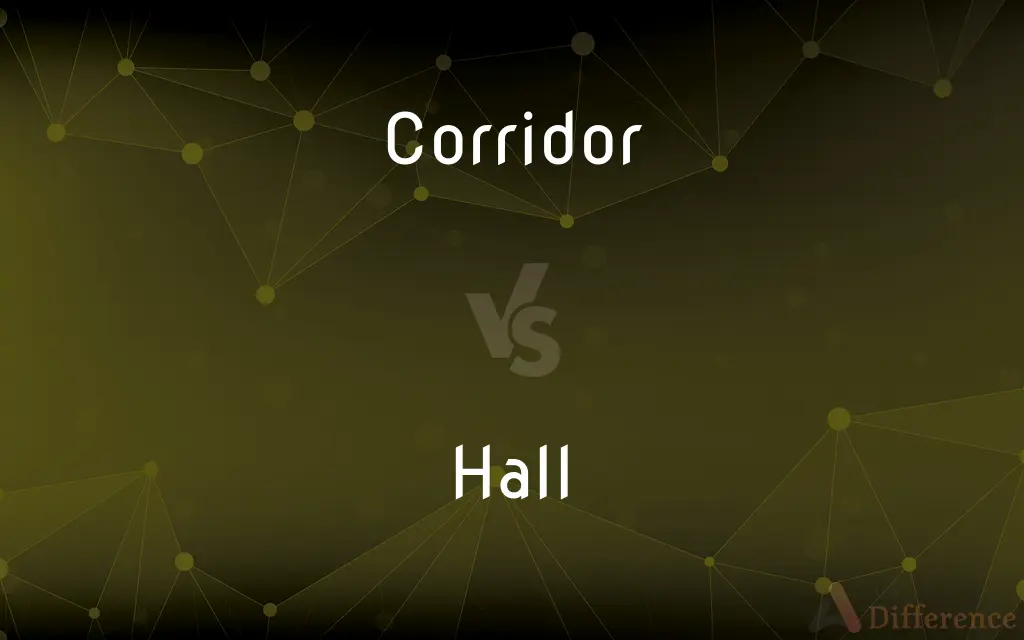Corridor vs. Hall — What's the Difference?
By Tayyaba Rehman & Urooj Arif — Updated on April 16, 2024
Corridors are typically narrow passages connecting rooms, while halls are broader and often serve as gathering spaces.

Difference Between Corridor and Hall
Table of Contents
ADVERTISEMENT
Key Differences
Corridors are long, narrow passageways within buildings, primarily used for movement between rooms or areas. On the other hand, halls are usually wider spaces that can serve multiple purposes, including gatherings, receptions, and events.
A corridor is generally enclosed and serves as a utility space, optimizing the flow of traffic and access to various sections of a building. Whereas a hall can be a central feature of a building, often architecturally grand, and designed to be a welcoming space.
The primary function of corridors is to facilitate discreet and efficient transit from one area to another without distractions. Conversely, halls are designed to accommodate people, sometimes providing seating or decorative elements that encourage lingering.
In terms of usage, corridors are mostly found in residential, office, or educational buildings as part of the internal structure. Halls, however, are common in public buildings like hotels, theaters, and schools, often used for specific functions like dining or assemblies.
Architecturally, corridors rarely feature prominent decor or furniture due to their limited space and utilitarian purpose. In contrast, halls may be elaborately decorated and furnished, reflecting their role in public engagement and aesthetics.
ADVERTISEMENT
Comparison Chart
Width
Narrow, just wide enough for passage
Broad, can accommodate multiple people
Purpose
Primarily for connecting different areas
Serves as gathering or transit area
Location
Within private and public buildings
Typically found in public or large buildings
Architectural Focus
Functional, minimal decor
May be decorative, focus on aesthetics
Common Uses
Access to rooms, emergency exits
Events, receptions, waiting area
Compare with Definitions
Corridor
A corridor is a narrow passageway in a building connecting various spaces.
The hotel’s long corridor led to all the guest rooms.
Hall
A hall in a building is a large room used for events and gatherings.
The grand hall was prepared for the wedding reception.
Corridor
Corridors are typically enclosed with doors and walls.
She walked down the corridor to reach the conference room.
Hall
Halls often feature architectural elements like high ceilings and ornate details.
The city hall’s ceiling was adorned with beautiful frescoes.
Corridor
In large buildings, corridors help manage the flow of traffic.
The corridor was busy with employees during lunchtime.
Hall
Halls can be multifunctional, serving as dining rooms, auditoriums, or reception areas.
The hall was quickly rearranged for the evening gala.
Corridor
Corridors often feature functional lighting and minimal decor.
The corridor was lit by simple overhead lights.
Hall
In academic settings, halls are used for assemblies and lectures.
Students gathered in the school hall for the annual day function.
Corridor
Corridors are essential for emergency exits and safety routes.
Emergency lights guided the way through the corridor during the drill.
Hall
Halls are central points for public interaction and activities.
The community hall hosted weekly events for residents.
Corridor
A long passage in a building from which doors lead into rooms
His room lay at the very end of the corridor
Hall
In architecture, a hall is a relatively large space enclosed by a roof and walls. In the Iron Age and early Middle Ages in northern Europe, a mead hall was where a lord and his retainers ate and also slept.
Corridor
A narrow hallway, passageway, or gallery, often with rooms or apartments opening onto it.
Hall
A corridor or passageway in a building.
Corridor
A tract of land designated or used for a specific purpose, as for railroad lines, highways, or pipelines.
Hall
A large entrance room or vestibule in a building; a lobby.
Corridor
A route designated for a specific purpose
A hazardous material corridor.
A sea corridor for shipping.
A flight corridor.
Hall
A building for public gatherings or entertainments.
Corridor
A route or tract of land used by migrating animals.
Hall
The large room in which such events are held.
Corridor
A thickly populated strip of land connecting two or more urban areas
People who live in the Boston-Washington corridor.
Hall
A building used for the gatherings and social activities of a church, fraternal order, or other organization.
Corridor
A narrow hall or passage with rooms leading off it, as in a building or in a railway carriage.
Hall
A building belonging to a school, college, or university that provides classroom, dormitory, or dining facilities.
Corridor
A restricted tract of land that allows passage between two places.
Hall
A large room in such a building.
Corridor
The covered way lying round the whole compass of the fortifications of a place.
Hall
The group of students using such a building
The entire hall stayed up late studying.
Corridor
Airspace restricted for the passage of aircraft.
Hall
Chiefly British A meal served in such a building.
Corridor
A gallery or passageway leading to several apartments of a house.
Hall
The main house on a landed estate.
Corridor
The covered way lying round the whole compass of the fortifications of a place.
Hall
The castle or house of a medieval monarch or noble.
Corridor
Any relatively narrow passageway or route, such as a strip of land through a foreign territory.
Hall
The principal room in such a castle or house, used for dining, entertaining, and sleeping.
Corridor
A densely populated stretch of land; as, the Northeast corridor, extending from Richmond, Virginia into Maine.
Hall
A corridor; a hallway.
The drinking fountain was out in the hall.
Corridor
An enclosed passageway; rooms usually open onto it
Hall
A meeting room.
The hotel had three halls for conferences, and two were in use by the convention.
Hall
A manor house (originally because a magistrate's court was held in the hall of his mansion).
The duke lived in a great hall overlooking the sea.
Hall
A building providing student accommodation at a university.
The student government hosted several social events so that students from different halls would intermingle.
Hall
The principal room of a secular medieval building.
Hall
(obsolete) Cleared passageway through a crowd, as for dancing.
Hall
A place for special professional education, or for conferring professional degrees or licences.
A Divinity Hall; Apothecaries' Hall
Hall
(India) A living room.
Hall
(Oxbridge) A college's canteen, which is often but not always coterminous with a traditional hall.
Hall
(Oxbridge slang) A meal served and eaten at a college's hall.
Hall
A building or room of considerable size and stateliness, used for public purposes; as, Westminster Hall, in London.
Hall
The chief room in a castle or manor house, and in early times the only public room, serving as the place of gathering for the lord's family with the retainers and servants, also for cooking and eating. It was often contrasted with the bower, which was the private or sleeping apartment.
Full sooty was her bower and eke her hall.
Hall
A vestibule, entrance room, etc., in the more elaborated buildings of later times.
Hall
A name given to many manor houses because the magistrate's court was held in the hall of his mansion; a chief mansion house.
Hall
A college in an English university (at Oxford, an unendowed college).
Hall
The apartment in which English university students dine in common; hence, the dinner itself; as, hall is at six o'clock.
Hall
Cleared passageway in a crowd; - formerly an exclamation.
Hall
An interior passage or corridor onto which rooms open;
The elevators were at the end of the hall
Hall
A large entrance or reception room or area
Hall
A large room for gatherings or entertainment;
Lecture hall
Pool hall
Hall
A college or university building containing living quarters for students
Hall
The large room of a manor or castle
Hall
English writer whose novel about a lesbian relationship was banned in Britain for many years (1883-1943)
Hall
United States child psychologist whose theories of child psychology strongly influenced educational psychology (1844-1924)
Hall
United States chemist who developed an economical method of producing aluminum from bauxite (1863-1914)
Hall
United States explorer who led three expeditions to the Arctic (1821-1871)
Hall
United States astronomer who discovered Phobos and Deimos (the two satellites of Mars) (1829-1907)
Hall
A large and imposing house
Hall
A large building used by a college or university for teaching or research;
Halls of learning
Hall
A large building for meetings or entertainment
Common Curiosities
How do safety requirements differ for corridors and halls?
Safety requirements for corridors focus on clear passage and emergency exits, while halls need to accommodate large groups safely.
Can halls be used for activities other than gatherings?
Yes, halls can also serve as exhibition spaces, dining areas, or even temporary classrooms.
Are corridors always part of the interior architecture?
Yes, corridors are typically interior elements designed to connect various spaces efficiently.
What is the primary purpose of a corridor?
The primary purpose of a corridor is to provide a passage connecting different areas within a building.
Can both corridors and halls be found in residential buildings?
Corridors are common in residential buildings, while halls are more typical in large or communal residences like dormitories or mansions.
Are there specific building codes for constructing corridors and halls?
Yes, there are specific building codes that address the width, exit routes, and safety features for both corridors and halls.
Do halls contribute to a building's aesthetic appeal?
Yes, halls often contribute significantly to the aesthetic appeal and architectural significance of a building.
Is there a difference in lighting between corridors and halls?
Yes, corridors usually have functional, straightforward lighting, while halls may have more elaborate and decorative lighting.
What types of events are typically held in halls?
Events such as receptions, conferences, and community gatherings are commonly held in halls.
What architectural features are common in halls?
Halls often have high ceilings, elaborate decor, and are designed to be visually appealing.
How does furniture placement differ between corridors and halls?
Furniture in corridors is minimal due to space constraints, whereas halls may have various furniture arrangements for different functions.
How do corridors facilitate traffic flow in buildings?
Corridors are designed to efficiently direct people to their destinations within a building, minimizing congestion.
What materials are commonly used in the construction of corridors?
Materials like concrete, plaster, and wood are commonly used in corridor construction for durability and ease of maintenance.
How do ventilation requirements differ between corridors and halls?
Ventilation needs are more significant in halls due to their larger size and capacity for hosting people, compared to the primarily transit-focused corridors.
Can corridors serve as emergency evacuation routes?
Yes, corridors are crucial for emergency evacuations, providing clear and direct paths to exits.
Share Your Discovery

Previous Comparison
Filtrate vs. Filtration
Next Comparison
Psychic vs. PsychicalAuthor Spotlight
Written by
Tayyaba RehmanTayyaba Rehman is a distinguished writer, currently serving as a primary contributor to askdifference.com. As a researcher in semantics and etymology, Tayyaba's passion for the complexity of languages and their distinctions has found a perfect home on the platform. Tayyaba delves into the intricacies of language, distinguishing between commonly confused words and phrases, thereby providing clarity for readers worldwide.
Co-written by
Urooj ArifUrooj is a skilled content writer at Ask Difference, known for her exceptional ability to simplify complex topics into engaging and informative content. With a passion for research and a flair for clear, concise writing, she consistently delivers articles that resonate with our diverse audience.














































